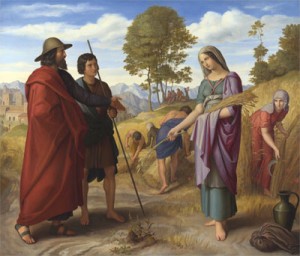Being Jewish
Commentary
Commentary: The Chosen Versus the First

The Book of Ruth, viewed by Goethe as the most beautiful “little whole” in the Hebrew Bible, is the special reading for Shavuot, which begins the evening of May 18. Toward the end of the narrative, a man named “Tob” makes a puzzling walk-on appearance, asserts his prerogatives–only in the next breath to repudiate them–and then shuffles offstage. Before Boaz may himself take possession of the field of Elimelech–deceased husband of Naomi–he must clear the matter with this elder kinsman who is first in line to fulfill this function. Tob consents at once to redeem the property until he is reminded that it entails a sticky, further obligation: taking possession of Ruth, Naomi’s widowed daughter-in-law. Since marriage to Ruth would compromise his own children’s inheritance, Tob precipitously withdraws, leaving Boaz a clear path. Since the final lines of Ruth announce that three generations later, David, progenitor of the Messiah, would spring from this union, one gathers the real point of this curious interlude with Tob is that David descends not from cautious Tob but chivalrous Boaz, virtuous hero of the narrative for Shavuot.
In Ruth, this elder redeemer episode is prefigured by several earlier relationships between rivals, each of which inverts usual expectations. Upon learning that Naomi’s sons, Mahlon and Kilyon, had been married to Moabites Orpah and Ruth, we are later surprised to hear that, reversing this ordering, Ruth’s husband was Mahlon. Later in the story the elders proclaim, “May the Lord make the wife who now enters your house like Rachel and Leah, who between them built the House of Israel.” We have grown so accustomed to Rachel, younger and better loved of the sisters, preceding Leah that we tend to forget that the wellspring of the House of David and Jewish destiny is Leah. Moreover, the very elders who grant syntactical precedence to Rachel are themselves descended from the tribe of Judah, fourth son of Leah. In short, if Leah’s natural precedence over Rachel has been subverted by tradition, it still must be accorded its proper due.
Yes, discord between Rachel and Leah should be seen through the prism of competition and jealousy between chosen and firstborn, a central motif of the early books of the Torah. In Ruth, this resurfaces as unfinished business from the past that cannot be bypassed, a burden whose shadow and force, one concludes, has to be exorcised before the birth of David. Past tableaux of reconciliation include Isaac and Ishmael together at Abraham’s funeral, Joseph and his brothers in Egypt, the partnership of Moses and Aaron, but a vital variation on this theme remained to be played out.
Boaz could easily have proceeded with the redemption of Elimelech’s parcel and marriage to the Moabite widow without first consulting with Tob who, until addressed, seemed entirely oblivious to his rights and obligations. Instead, in Ruth 4:1-12 we witness the essential, transformative, purging initiative of the younger seeking out and obtaining permission of the elder–these symbolically embodying the principles of the chosen and firstborn–before he seeks to exercise privileges or obligations appertaining to the other.
Goethe may well be correct, but he surely missed the forest for the trees. Robert Alter, elder kinsman of all biblical exegetes in his wake, alerts us that each “little whole” in the Bible stands in dynamic relation to a forest of meaning, a narrative continuum that lends it meaning. The annunciation of David at the end of the Book of Ruth signals the time is at hand for magnanimity, reconciliation and messianic closure of the theme of jealousy and competition between brethren. Hence, Boaz’s generosity of spirit in his dealings not alone with his kinswomen Ruth but, going one step further, with prudent Tob.









 Facebook
Facebook Instagram
Instagram Twitter
Twitter
Leave a Reply